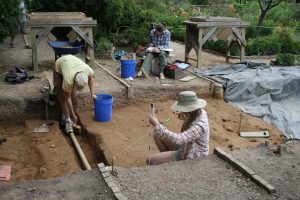Request a brochure and catalog . . . click here.
Request a free application . . . click here.
Privacy Policy . . . click here.
This is a hybrid of the Great Books of the World and a more traditional style program. The Bachelor of Biblical Archaeology (B.B.A.) degree program will acquaint the student with a broad perspective of Biblical archaeology. Students are guaranteed a breadth of knowledge, as well as depth in the commitment to identifying absolute truths in the search for God. The broad-based nature of this curriculum provides a knowledge-base and the communication and analytical skills appropriate to living a full life dedicated to the search for truth. Completing this program will allow you to be ordained as an Assistant Dean in the Reconciliation of Science and Religion Organization.
Student Learning Outcomes
Students graduating with a Bachelor of Biblical Archaeology (B.B.A.) program should:
- Demonstrate the ability to identify truths while engaging in the great debate over the existence of God
- Demonstrate the ability to apply logic and acknowledge the limitations in the search for truths.
- Contribute to the knowledge-base of truth by challenging or adding to the content.
- Demonstrate articulate communication (written and oral) skills
- Practice independent thinking tempered by respect for others and the environment; to become an informed, responsible, active citizen, and lead others to the search for God.
Required Courses
Undergraduate Level 1
BRE101 Bucolic Readings in Critical Thinking and Writing (3 Semester Credit Hours)
BRE 102 Bucolic Readings in Intermediate Composition and Critical Thinking (3 Semester Credit Hours)
BRP 102 Bucolic Readings in Introduction to Philosophy (3 Semester Credit Hours)
BRG 101 Bucolic Readings in Introduction to U.S. Government (3 Semester Credit Hours)
BRP 101 Bucolic Readings in Introduction to Psychology (3 Semester Credit Hours)
BRW 101 Bucolic Readings in World Civilization I (3 Semester Credit Hours)
BRW 102 Bucolic Readings in World Civilization II (3 Semester Credit Hours)
BRH 101 Bucolic Readings in History and Literature of the Old Testament (3 Semester Credit Hours)
BRH 201 Bucolic Readings in History and Literature of the New Testament (3 Semester Credit Hours)
ITS 101 Identifying Truth in the Search for God in Science (3 Credit Hours)
Undergraduate Level 2
RGH 201 Reconciling God and the Humanities (10 Credit Hours) ***
RGM 201 Reconciling God and Mathematics (5 Credit Hours) ***
RGS 201 Reconciling God and Science (10 Credit Hours) ***
PHL 201 Philosophy and the Search for God II (10 Credit Hours)
THE 201 Theology II (10 Credit Hours) ***
Undergraduate Level 3
BIA 301 Life on an Archaeological Dig (3 Credit Hours)
BIA 302 Israel, an Archaeological Journey (3 Credit Hours)
BIA 303 Masada, the Dead Sea Desert Fortress (3 Credit Hours)
BIA 304 Exploring Jordan, the Other Biblical Land (3 Credit Hours)
BIA 305 Exploring Jesus’ Life (3 Credit Hours)
BIA 306 Life in the Ancient World (3 Credit Hours)
BIA 307 Important Biblical Archaeology Discoveries (3 Credit Hours)
BIA 308 Easter, Exploring the Resurrection of Jesus (3 Credit Hours)
BIA 309 Birth of Jesus in History and Tradition (3 Credit Hours)
BIA 310 Review of Holy Bibles (3 Credit Hours)
BIA 311 Exploring Genesis the Bibles Ancient Traditions (3 Credit Hours)
BIA 312 Jerusalem Archaeology (3 Credit Hours)
BIA 313 Ancient Israel in Egypt and the Exodus (3 Credit Hours)
BIA 314 Jewish Law and Early Christianity (3 Credit Hours)
BIA 352 Identifying and Contributing to the Truth Knowledge-Base (3 Credit Hours)
Required to Graduate: 120 semester credit hours
*** Students who meet the necessary years of life and professional experience may substitute essays based on that experience as substitution for these courses. The essays will be developed by Trinity College, graded, and the score assigned as a final grade for the course. For more information, see the policy regarding life experience limitation and criteria.
